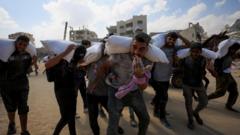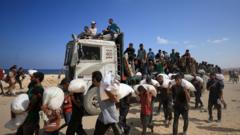More than 100 Palestinian fatalities reported as the international community urges action against the ongoing crisis
UK and 27 Nations Demand Immediate Ceasefire in Gaza Amidst Civilian Suffering

UK and 27 Nations Demand Immediate Ceasefire in Gaza Amidst Civilian Suffering
Joint condemnation highlights the urgent need for humanitarian aid amidst rising casualties
The UK and 27 other countries have urgently called for an end to the conflict in Gaza, citing a significant escalation in civilian suffering. Their joint statement characterizes Israel's aid distribution practices as perilous and condemns the ongoing "inhumane killing" of civilians as they seek basic necessities like food and water.
Official reports indicate that over 100 Palestinians lost their lives to Israeli fire while waiting for food last weekend alone, further magnifying the humanitarian crisis in the territory. Israel's foreign ministry dismissed this collective statement, accusing it of misrepresenting the reality on the ground and undermining its efforts against Hamas.
The condemnation arrives amid alarming accounts from Gaza's healthcare system, which reports severe malnutrition and skyrocketing death rates tied to a lack of food. UN officials now warn that the hunger situation has reached unprecedented levels, with 90,000 women and children in dire need of assistance.
The statement from the UK, along with other nations—including France, Canada, and Australia—begins with an emphatic call for an immediate ceasefire. It highlights the deepening humanitarian catastrophe for civilians in Gaza and stresses that the current aid model is dangerous and humiliating for those affected.
International humanitarian organizations have repeatedly called upon Israel to stop its military operations in populated areas, which they argue have led to civilian casualties. The diplomatic community is increasingly frustrated by Israel’s refusal to change its approach to humanitarian assistance in the region. Many aid workers also report that recent Israeli proposals to relocate Gaza's population to a "humanitarian city" would constitute forced displacement and violate international humanitarian laws, stripping residents of their rights and dignity.
Israeli government representatives counter that Hamas bears ultimate responsibility for the ongoing conflict and that they are acting appropriately under international law while facilitating aid entry. However, both the UN and humanitarian experts have cautioned against the alleged safety measures put forth by Israel, suggesting that they could create a false sense of security while ignoring the dire realities faced by Gaza's citizens.
Healthcare professionals in Gaza have voiced their despair, mentioning the complete lack of resources to care for those in need as hospitals and clinics buckle under the pressure of shortages. Families report devastating conditions, with children suffering profound hunger, as food costs skyrocket amid blockades.
The foreign ministers’ statement indicates a willingness to escalate actions if necessary to support peace. While some see this as a potential shift towards recognizing Palestinian statehood, the Israel Defense Forces maintain that resistance to ceasefire negotiations lies squarely with Hamas. As the crisis deepens, the international community grapples with its responses to a situation marked by immense human suffering.
Official reports indicate that over 100 Palestinians lost their lives to Israeli fire while waiting for food last weekend alone, further magnifying the humanitarian crisis in the territory. Israel's foreign ministry dismissed this collective statement, accusing it of misrepresenting the reality on the ground and undermining its efforts against Hamas.
The condemnation arrives amid alarming accounts from Gaza's healthcare system, which reports severe malnutrition and skyrocketing death rates tied to a lack of food. UN officials now warn that the hunger situation has reached unprecedented levels, with 90,000 women and children in dire need of assistance.
The statement from the UK, along with other nations—including France, Canada, and Australia—begins with an emphatic call for an immediate ceasefire. It highlights the deepening humanitarian catastrophe for civilians in Gaza and stresses that the current aid model is dangerous and humiliating for those affected.
International humanitarian organizations have repeatedly called upon Israel to stop its military operations in populated areas, which they argue have led to civilian casualties. The diplomatic community is increasingly frustrated by Israel’s refusal to change its approach to humanitarian assistance in the region. Many aid workers also report that recent Israeli proposals to relocate Gaza's population to a "humanitarian city" would constitute forced displacement and violate international humanitarian laws, stripping residents of their rights and dignity.
Israeli government representatives counter that Hamas bears ultimate responsibility for the ongoing conflict and that they are acting appropriately under international law while facilitating aid entry. However, both the UN and humanitarian experts have cautioned against the alleged safety measures put forth by Israel, suggesting that they could create a false sense of security while ignoring the dire realities faced by Gaza's citizens.
Healthcare professionals in Gaza have voiced their despair, mentioning the complete lack of resources to care for those in need as hospitals and clinics buckle under the pressure of shortages. Families report devastating conditions, with children suffering profound hunger, as food costs skyrocket amid blockades.
The foreign ministers’ statement indicates a willingness to escalate actions if necessary to support peace. While some see this as a potential shift towards recognizing Palestinian statehood, the Israel Defense Forces maintain that resistance to ceasefire negotiations lies squarely with Hamas. As the crisis deepens, the international community grapples with its responses to a situation marked by immense human suffering.




















